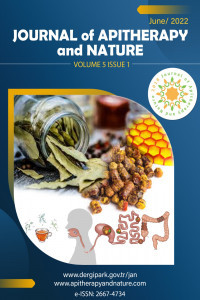ARC (Apiceutical Research Centre): Exploring a New Generation of Medicines from the Beehive
ARC (Apiceutical Research Centre): Exploring a New Generation of Medicines from the Beehive
___
- .
- Yayın Aralığı: Yılda 2 Sayı
- Başlangıç: 2018
- Yayıncı: Oktay YILDIZ
Carmen Violeta POPESCU, Hazem ABBAS, Stefan MANEA, Lili IVOPOL, Alina DUNE, Candice POPINIUC, Dumitru LUPULEASA
The Effect of Propolis on Selected Blood Parameters of Broilers
İvan MISKULIN, İvana KLARIC, Matija DOMACINOVIC, Berislav PRAKATUR, Zvonimir STEINER, Vatroslav SERIC, Maja MISKULIN
Isolated Xanthones from Lisotrigona furva Propolis in Vietnam
Le Nguyen THANH, Ha Thi THOA, Vu Thi Kim OANH, Diep Thi Lan PHUONG, Hoang Thi VAN, Nguyen Quynh CHI, Tran Huu GIAP, Nguyen Thi Tu OANH, Nguyen Thi Minh HANG, Nguyen Van HUNG, Chau Van MINH, Vassya BANKOVA
Chemical Composition of Selected Propolis Samples from Kyrgyzstan and Kazakhstan
Argyro PETROPOULOU, Konstantia GRAIKOU, Jaroslaw WIDELSKI, Krystyna SKALICKA-WOŹNIAK, Zuriyadda SAKIPOVA, İoanna CHINOU
Cytotoxic Activity of Four Propolis Colombian Samples Against Canine Osteosarcoma Cells
Dolly Patricia Pardo MORA, Oscar Julián MURILLO, Mauricio Rey BUITRAGO, Mónica LOSADA, Jaime Fabian Cruz URIBE, Karina Basso SANTIAGO, Bruno José CONTI, José Maurício SFORCIN
Formulations Containing Propolis of Apis mellifera with Antibacterial and Antitumoral Activity
G.a. DOS SANTOS, A.a. LAGAREIRO NETTO, P.b. MENDES, V. NEGRÃO, M.C. MARCUCCI, S.N. DINIZ, M.J. CARNEIRO, A.C.H.F. SAWAYA
Muhammad IQBAL, Tai-ping FAN, David WATSON, Sameah ALENEZI, Muhamad SAHLAN
Effects of Propolis on the Quorum Sensing of Selected Biofilm Producing Bacterial Species
K. TENNICK, S. WAFA, H. FEARNLEY, M. GOMEZ ESCALADA
Antituberculosis Activity of Propolis
Jarosław WIDELSKI, Joanna GOLUS, Piotr OKIŃCZYC, Rafał SAWICKI, Grażyna GINALSKA, Tomasz MROCZEK, Zuriyadda SAKIPOVA, İoanna CHINOU, Krystyna SKALICKA-WOŹNIAK
Intestinal Morphology Broiler Chickens Supplemented with Propolis
Maja MISKULIN, İvana KLARIC, Matija DOMACINOVIC, Berislav PRAKATUR, Mirela PAVIC, Nika PAVLOVIC, İvan MISKULIN
